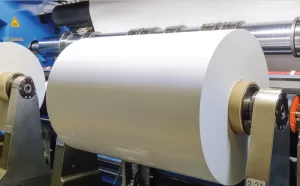Produce More Sustainable Cards with PET Film
The benefits of biaxially-drawn polyethylene terephthalate (BOPET) film, when used as either a core or overlay film, have long been recognized, and today this film is used in a wide range of national ID and other long-life card applications due to their durability, cost effectiveness and simplicity of implementation into existing manufacturing processes and card structures. However, more recently it is the benefits that this film can provide as part of an overall sustainability strategy which have become increasingly important and are driving several new product developments.

Product sustainability should be assessed holistically across the lifecycle of products and should take into account the impact on the wider value in which they operate. Compared to other filmic materials used in card laminate structures, PET films deliver significant sustainability benefits across the full lifecycle of a card from the impact of production, the performance in use and lastly end-of-life outcomes.
Reducing the environmental impact during production
At the start of the product lifecycle, Melinex® PET films have a significantly lower environmental impact during production with a lower carbon footprint and lower water usage compared to many alternative products.
“A key focus for Mylar Specialty Films is reducing the environmental impact on the products we supply, which has led to the development of a new range of Melinex® PET films for card applications with high levels of post-consumer recycled content or 30% bio-derived raw materials,” said Steven Davies, commercial leader at Mylar Specialty Films.
The company pioneered the use of post-consumer recycled content in PET films over a decade ago and currently supplies recycled PET (rPET) films into several high-end applications such as packaging, labels and industrial specialties.
Melinex® CORE and OVERLAY films are now being developed with high levels of post-consumer recycled content, delivering a further reduction in carbon footprint and providing a long-lasting high value application for single use packaging waste. These films can also be produced with 30% bio-based raw materials derived from second generation sustainable feedstocks.
Enabling better end-of-life outcomes
Increasingly the principles of green chemistry and safe design for recycling guidelines are being adopted by companies and governments to help enable safer and more sustainable end-of-life outcomes. Melinex® PET films are halogen free with no hazardous materials in the product or created as a by-product during the manufacturing process; and therefore they have no negative impact on the safe and economic disposal at the end of the card’s life.
Recycling end-of-life cards remains a challenge due to their complex nature and the lack of collection schemes. However, PET does provide a promising building block for future recycling processes as it is the most widely recycled plastic globally, with best-in-class mechanical and chemical recycling technologies demonstrated at scale and across multiple industries.
Current research is focusing on monomer recycling, which represents the most viable option for a closed-loop recycling process for the card industry, potentially taking an end-of-life product and safely and economically recovering the material for re-use in the production of new cards.
Extending the product lifetime
Minimizing the impact during production and improving the end-of-life outcomes are important aspects to consider when assessing the sustainability of a product across the lifecycle, but it is during the course of the product’s lifetime that PET films deliver arguably the biggest sustainability benefit.
Positioned above re-use and recycling in the waste hierarchy, a reduction in consumption is one of the most important factors for any company to consider when implementing their sustainability strategy. With superior temperature, solvent and flex resistance compared to PVC and PETG films, incorporating these films in the final laminate structure significantly increases product lifetime which ultimately leads to the reduction of plastic use by the cards industry.
Sustainability without compromise
Reducing the impact of a product at the start of life and enabling safer and more sustainable end-of-life outcomes are important parts of a sustainable strategy, but not if that comes at the cost of performance during life. Incorporating specialty PET films into card structures not only has positive impacts at the start and the end of the product lifecycle, but also delivers enhanced durability which can increase the lifetime of a card without decreasing its performance—sustainability without compromise.
About the Author: Steven Davies is the commercial leader for Mylar Specialty Films in the EMEA region. He has more than 25 years of experience in the polyester films business, with extensive experience in the use of recycled content in PET films used in markets as diverse as packaging, labels and industrial specialties. Mylar Specialty Films is one of the world’s premier suppliers of BOPET films with manufacturing sites in Europe, the United States and Asia and 2024 marks the 70th anniversary of the company’s commercialization of BOPET films under the Melinex® and Mylar® brand names. Increasingly the sustainability benefits of these products are becoming an important part of the product offer in addition to the unique set of film properties.
